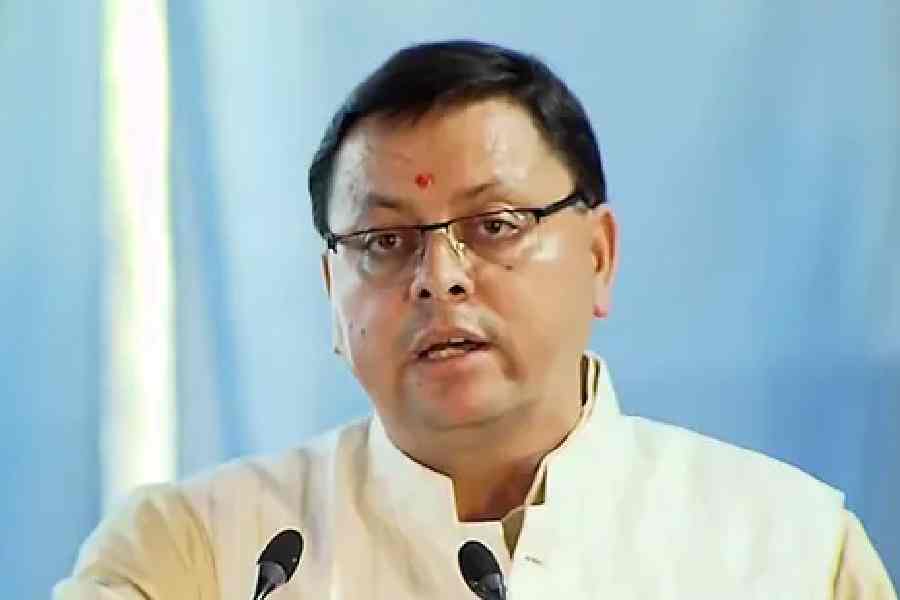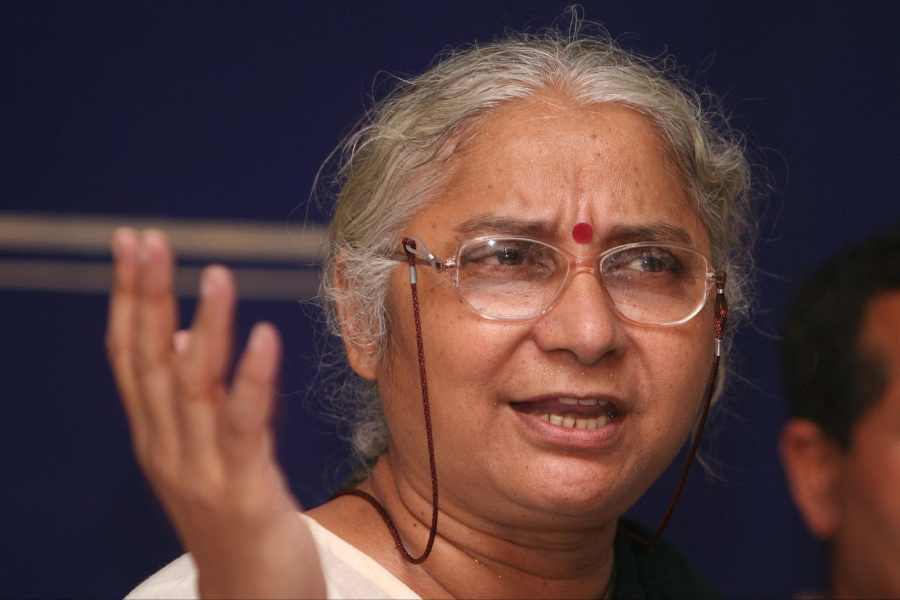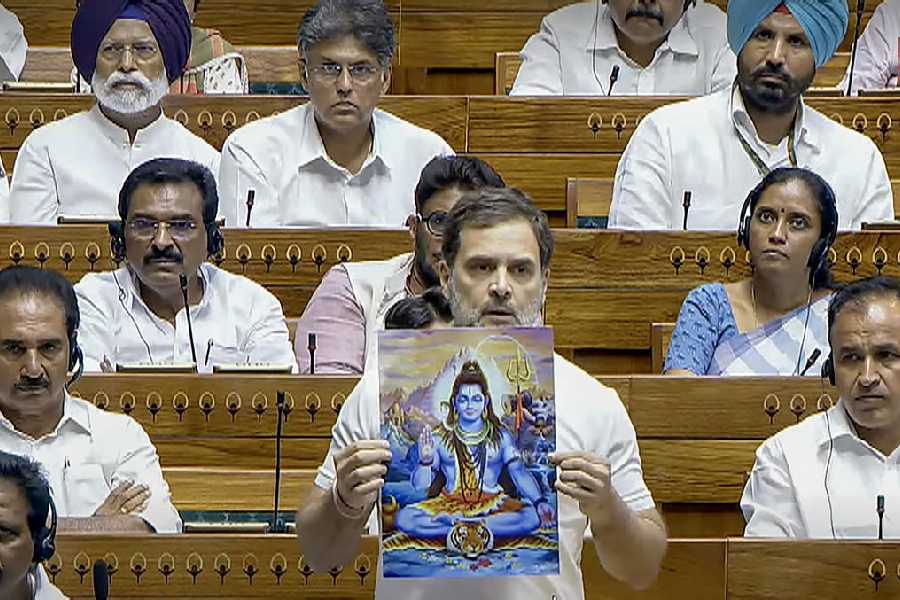The BJP government in Uttarakhand on Tuesday tabled an ordinance on a Uniform Civil Code making it mandatory for live-in partners to register themselves with district officials or face imprisonment for up to three months, also laying down that all marriages would have to be registered and that it would be solemnised only when “neither party has a spouse”.
The ordinance, which is likely to be passed in the Assembly on Wednesday as the BJP has 47 members in the 70-member House, also seeks to ban polygamy and the practices of Halala and Iddat, besides making the registration of marriages compulsory for all.
Social activists denounced the proposed UCC as anti-Muslim, while the Congress called it a diversionary tactic and lambasted the "autocratic" manner in which it was tabled by the government.
The proposed UCC also says that any child born of a live-in relationship shall be considered a legitimate child. The bill proposes a common law on marriage, divorce, land, property and inheritance for all citizens irrespective of their religion, excluding the Scheduled Tribes.
When passed, Uttarakhand will become the first state post-Independence to have a UCC in place.
The proposed UCC, which was tabled in the House by chief minister Pushkar Singh Dhami amid chants of "Jai Shri Ram" and "Bharat Mata Ki Jai" by the BJP members, makes it obligatory for partners in a live-in relationship within the state, whether they are residents of Uttarakhand or not, to submit a statement of their relationship in a prescribed format to the registrar within whose jurisdiction they are living. Live-in relationships in which at least one partner is a minor will not be registered. If any of the partners is under the age of 21, the registrar will inform their parents or guardians, according to the bill.
Live-in relationships where the consent of one of the partners was obtained by force, coercion, undue influence, misrepresentation or fraud concerning the identity of the other partner, will also not be registered.
Anyone staying in a live-in relationship for more than a month without getting it registered can be punished with imprisonment up to three months or a fine up to Rs 10,000 or both, the ordinance says.
A higher fine can be imposed on any person who provides false information in his or her statement on a live-in relationship to the registrar. If a woman in a live-in relationship is deserted by her partner, she will be entitled to claim maintenance from him for which she may approach a competent court having jurisdiction over the place where they last cohabited, the ordinance states.
The proposed UCC says that a marriage will be solemnised or contracted only when “neither party has a spouse” at that time. The man should be at least 21 and the woman 18 at the time of marriage. A marriage can be solemnised in accordance with any religious belief.
“A marriage solemnised in the State or outside the territory thereof, after the commencement of this Code, where at least one party to the marriage is a resident of the State, shall be registered,” the proposed UCC states, adding that this procedure has to be completed within 60 days of marriage. The partner will also have the right to appeal within 60 days of the issuance of the decree of divorce.
The government will appoint registrars-general, registrars and sub-registrars to accept or reject appeals of marriage or divorce and hear other related cases. One will be liable to pay a fine of Rs 25,000 if they fail to get the marriage registered. False information with regard to marriage or divorce will entail a jail term up to three months and a fine up to Rs 25,000.
The proposed UCC also states that any marriage solemnised before or after the commencement of the code can be dissolved by a decree of divorce on the ground that the other party “converted to another religion to which the petitioner belonged; or been of incurable or unsound mind”.
A wife can seek divorce if she finds out after marriage that her husband has more than one wife.
Nullifying the Muslim personal laws related to Iddat and Halala, the proposed UCC says: “Right to remarry includes the right to remarry the divorced spouse without any condition, such as marrying a third person before such marriage.”
Halala recommends that a divorced woman remarry before she can return to her ex-husband if he has uttered the instant triple talaq in anger and realised it was a mistake. Iddat is a mandatory period a woman has to remain single after divorce, or on the death of her husband, before opting for remarriage.
Violation of this provision will attract a jail term up to six months and a fine of Rs 50,000. The time of imprisonment may be extended up to three years if a divorce was procured without following the rules or by misinforming the authority concerned.
The UCC keeps the Scheduled Tribes out of its ambit, saying: “Nothing contained in this Code shall apply to the members of any Scheduled Tribe.”
Congress MLA Pritam Singh said: “We don’t oppose the ordinance but we oppose the way the government is trying to bring it autocratically. We were informed in writing that it was an extension of the last session, but on Monday the government informed us that it is a special session of just four days. They have scrapped Question Hour, which is against the convention and the rule of the House.”
Yashpal Arya, the leader of the Opposition, told the House: “Uttarakhand is facing grave problems of law and order and corruption. Our daughter, a resort receptionist, was killed in Paudi Garhwal by those who belonged to the ruling party, but justice is yet to be delivered. Bringing the UCC by putting genuine issues on the back burner is wrong.”
Copies of the UCC draft were made available to all the MLAs on Tuesday after it was tabled in the House at 11am and they were given time till 2pm to study it and express their views.
Ira Khan, a social activist in Uttar Pradesh who works for women, said: “The intention of the UCC became clear when the BJP MLAs chanted Jai Sri Ram. They are not interested in empowering women, they are interested in insulting a particular community.”
Premchand Agrawal, the parliamentary affairs minister, said in the House when the members assembled in the afternoon to debate the ordinance, said: “The Congress doesn’t accept the UCC; it also doesn’t accept the existence of Lord Ram. Had they believed in the Hindu religion, they would have built a Ram temple in Ayodhya.... Finally, we did the job and Pran Pratishtha of the temple was done there last month.”
Additional reporting by PTI










